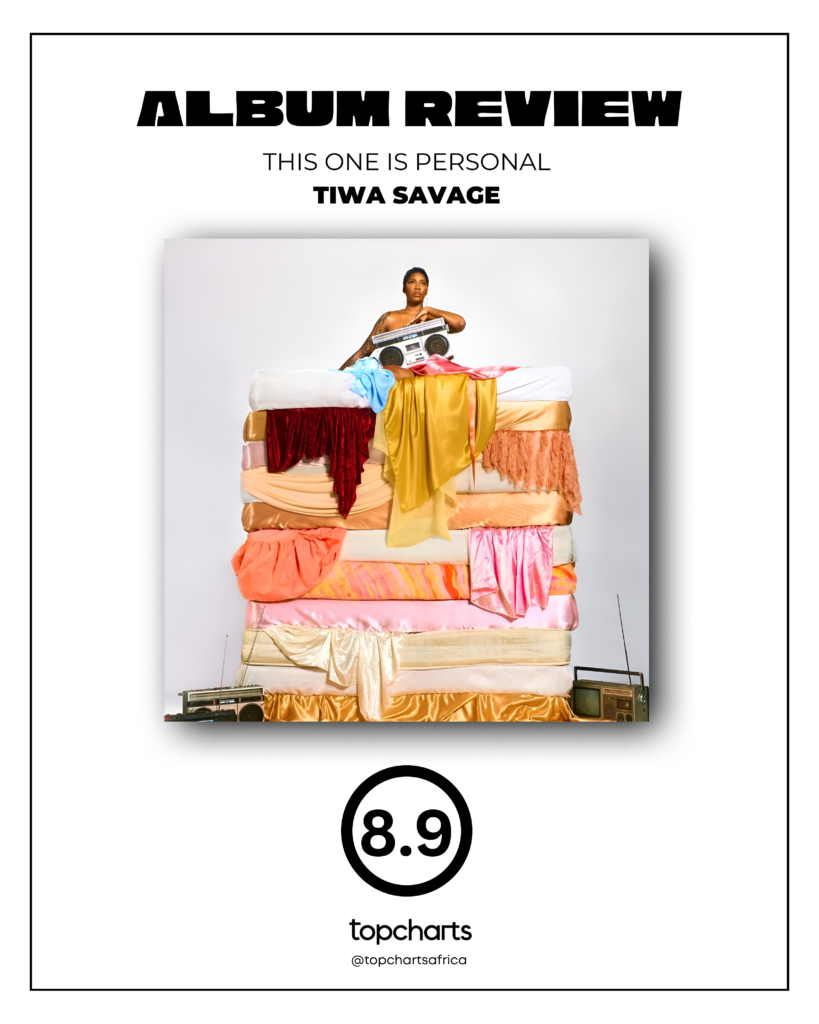
Fifteen years into a remarkable music career, Tiwa Savage has arrived at a place few artists ever get to: a creative space entirely her own. From her earliest beginnings as a songwriter in Los Angeles and London, immersed in the textures of R&B, to her explosive return to Nigeria where she became one of the architects of the Afrobeats wave, Tiwa’s story has always been about reinvention. But that reinvention came with an immense pressure: the need to keep delivering hits, to bend her artistry into whatever shape the market demanded, a market that rewards virality over talent. Tiwa to prove over and over that a woman could stand shoulder-to-shoulder with the giants of a male-dominated industry. She succeeded, spectacularly so, with tracks that ranged from the club-ready chaos of Diet to the youth-driven virality of Loaded ft. Asake, the global afropop anthem Somebody’s Son ft. Brandy, collaborations across the world, and international moves that made her one of Afrobeats’ most visible ambassadors. Yet in all of this constant evolution, something was missing, the Tiwa who once fell in love with the slow burn of R&B.

Yet chasing hits comes at a cost. For years, her artistry was intertwined with market demands; the focus on chart dominance and radio play, while it showcased her adaptability, it left little room for purely personal expression. This One Is Personal represents the liberation of that space. At 45, Tiwa is no longer measuring herself against the latest trends or what’s expected of an Afrobeats queen. She is creating music that fuels her soul, exploring the R&B roots that she first mastered as a songwriter in LA. The album is intimate, reflective, and unapologetically Tiwa, an artist fully in command of her voice, her story, and her creative vision. It’s a statement of self-possession: she has earned the right to make music for herself, on her terms, and in doing so, she invites listeners into a space that is deeply personal yet universally relatable.
Tiwa’s vocals throughout the album are nothing short of masterful. From the raw vulnerability of I’m Done to the sultry confidence of tracks like On The Low and Addicted, her range, control, and emotive power are on full display. There is a maturity in her voice now that comes from experience, a clarity and precision in delivery that can convey heartbreak, joy, and empowerment with equal impact. Her ability to effortlessly shift from tender, introspective passages to bold, energetic statements reflects an artist who is entirely comfortable in her craft. Collaborations with artists like Skepta and Taves highlight her skill in blending her sound with others without ever losing her essence, while the duet with James Fauntleroy on Change demonstrates a sophisticated harmonic interplay that elevates the album’s emotional resonance.

The production on This One Is Personal is consistently polished and nuanced, creating a lush, immersive soundscape that complements Tiwa’s vocal delivery. There’s a seamless fusion of classic R&B and modern Afrobeats elements: sultry synths, smooth percussion, and subtle, layered instrumentation that evoke the nostalgia of early 2000s R&B while maintaining contemporary appeal. Every aspect of the production choice feels deliberate, serving the song and the story rather than distracting from it. Even tracks that lean more upbeat, like You4Me or On The Low, retain an emotional depth that separates this album from standard Afrobeats offerings. The production gives Tiwa the freedom to breathe, to express, and to invite the listener into her world.
Unlike typical hit-driven projects, the album flows like a narrative, taking the listener on an intimate journey through love, heartbreak, confidence, and self-reflection. Each song builds upon the last, creating a rhythm of emotion that alternates between introspection and empowerment, vulnerability and celebration. Tracks like Will I Run Again? and You’re Not the First (You’re Just the Worst) reveal moments of vulnerability while For One Night and Addicted provide high points of melodic allure and replay value. There’s a cinematic quality to the way the album unfolds, making it feel less like a collection of singles and more like a cohesive statement, a diary of emotions translated into song. Tiwa is not writing for the algorithm here; she is writing for herself, and in doing so, she draws her listeners closer than ever before.

Tiwa’s lyricism shines throughout, balancing clever wordplay with deeply relatable narratives. She tackles love, desire, heartbreak, and self-empowerment with equal skill. Lines like “Phone on 10%, that’s when he sent a text, left my session for sex got no regrets” (10%) demonstrate her ability to turn real-life moments into memorable, witty storytelling, while You’re Not The First (You’re Just The Worst) showcases her mastery of emotional resonance. The album’s lyricism is personal, often confessional, but never self-indulgent; it invites the listener into her experiences without ever losing universal appeal.
Still, like any honest journey, there are valleys as well as peaks. The middle stretch of the album; songs like Twisted and Scared of Love, slows the pace and, while beautifully produced and sung, they are less memorable than the towering highlights around them. Yet their inclusion is not a flaw so much as a choice: they give the project a natural rhythm, ensuring the brighter moments feel even more explosive. Rather than skipping over them, they become spaces to breathe, much like interludes in a diary. And that’s what this album often feels like: a diary, or perhaps a love letter, written to the younger Tiwa Savage who once dreamed of an R&B career but had to shelve that dream to survive the grind of the Afrobeats industry.

Seen this way, This One Is Personal is almost therapeutic. It is Tiwa allowing herself to go back to the girl who once sang love songs in her bedroom, who once studied the greats of R&B, and finally saying to her: “I didn’t forget you.” This record honors that younger self by delivering the kind of album she always wanted to make, without compromise. It is a reminder that even after 15 years of bending, stretching, and reshaping herself to meet the demands of a rapidly shifting scene, Tiwa Savage has never lost sight of who she truly is.
And so the album concludes truly as a reclamation. This One Is Personal is the sound of an artist standing still, no longer sprinting to keep up with anyone else, no longer proving her worth, but savoring the music she loves most. It is intimate, unhurried, and deeply confident. For fans who discovered her through Afrobeats, it is a revelation of another side of her artistry; for those who remember her R&B beginnings, it is a homecoming long overdue. Either way, the result is one of the most cohesive and emotionally resonant albums in her career. Tiwa Savage has already secured her crown as the queen of Afrobeats, but with this project, she reminds us that before the crown, there was always the artist. And in choosing to honor that artist now, she has given us her most personal gift yet.
Sound & Production = 1.8/2
Lyrics & writing = 2/2
Performance = 2/2
Originality = 1.8/2
Reply value = 1.3/2
8.9/10

